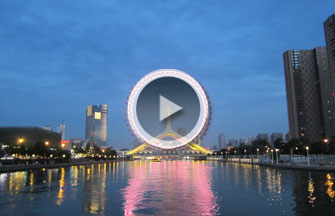Voter turnout in Tibet tops 94%: white paper
Updated: 2013-10-22 11:49
(Xinhua)
|
|||||||||||
BEIJING - Voter turnout in Tibet's local elections exceeded 94 percent in 2012, says a white paper issued on Tuesday.
According to "Development and Progress of Tibet" issued by the Information Office of the State Council, deputies of Tibetan and other ethnic minorities make up the overwhelming majority in the local congresses at all levels.
Figures show that, in 2012, among the 34,244 deputies elected directly and indirectly at the levels of region, prefecture, county and village, 31,901 were from the Tibetan, Moinba, Lhoba, Naxi, Hui, Zhuang and other ethnic minorities, accounting for more than 93 percent.
People's congresses are a fundamental aspect of the political system of China. It is via the National People's Congress (NPC) and local people's congresses at different levels that the Chinese people are involved in managing state affairs and exercising state power.
Among the present NPC deputies, 20 are from the Tibet autonomous region, of whom 12 are from the Tibetan ethnic group, and one each from the Moinba and Lhoba ethnic groups, the white paper says.
Local women have seen their social status raised markedly. Female deputies make up 25.4 percent of the total at the Tibet regional people's congress, and 34.5 percent of all civil servants at all levels in Tibet.
Since the Tibet autonomous region was set up in 1965, the regional people's congress and its standing committee have made over 290 local laws and regulations, or resolutions and decisions of a legislative nature, and formulated measures for the flexible implementation of some state laws in Tibet to suit local conditions.
For example, Tibet made alternative regulations in 1981 and 2004 as marriageable ages for men and women were reduced by two years from those prescribed in the Marriage Law of the People's Republic of China. Polyandrous and polygynous relations that existed before the regulations took effect were allowed to continue if no one involved proposed dissolution of the marriage.
All Chinese citizens living in Tibet who are 18 years old or above, regardless of gender, occupation, family background, ethnicity, religious belief, educational background, financial conditions or length of residence in this region, enjoy the right to vote and the right to be elected.
Related Stories
China issues white paper on Tibet's development 2013-10-22 10:53
Dalai Lama accused of seeking 'Tibet independence' 2013-10-19 08:06
Tibet to reduce poverty by 45% 2013-10-16 16:13
Tibet's first Western restaurant makes National Day international 2013-10-08 10:36
Tibet expected to witness bumper harvest 2013-10-01 12:49
Faces of Tibet 2013-09-20 00:19
Today's Top News
UK official looks to China for support
Economy to see 'good ending' in Q4
Teacher killed in US school shooting
Border agreement to boost ties
US OKs Alibaba structure
Beijing works to spur global development
Scientists requested government to plant GM crops
Travelers to Europe bypass attractions of Brussels
Hot Topics
Lunar probe , China growth forecasts, Emission rules get tougher, China seen through 'colored lens', International board,
Editor's Picks

|

|

|

|

|

|





